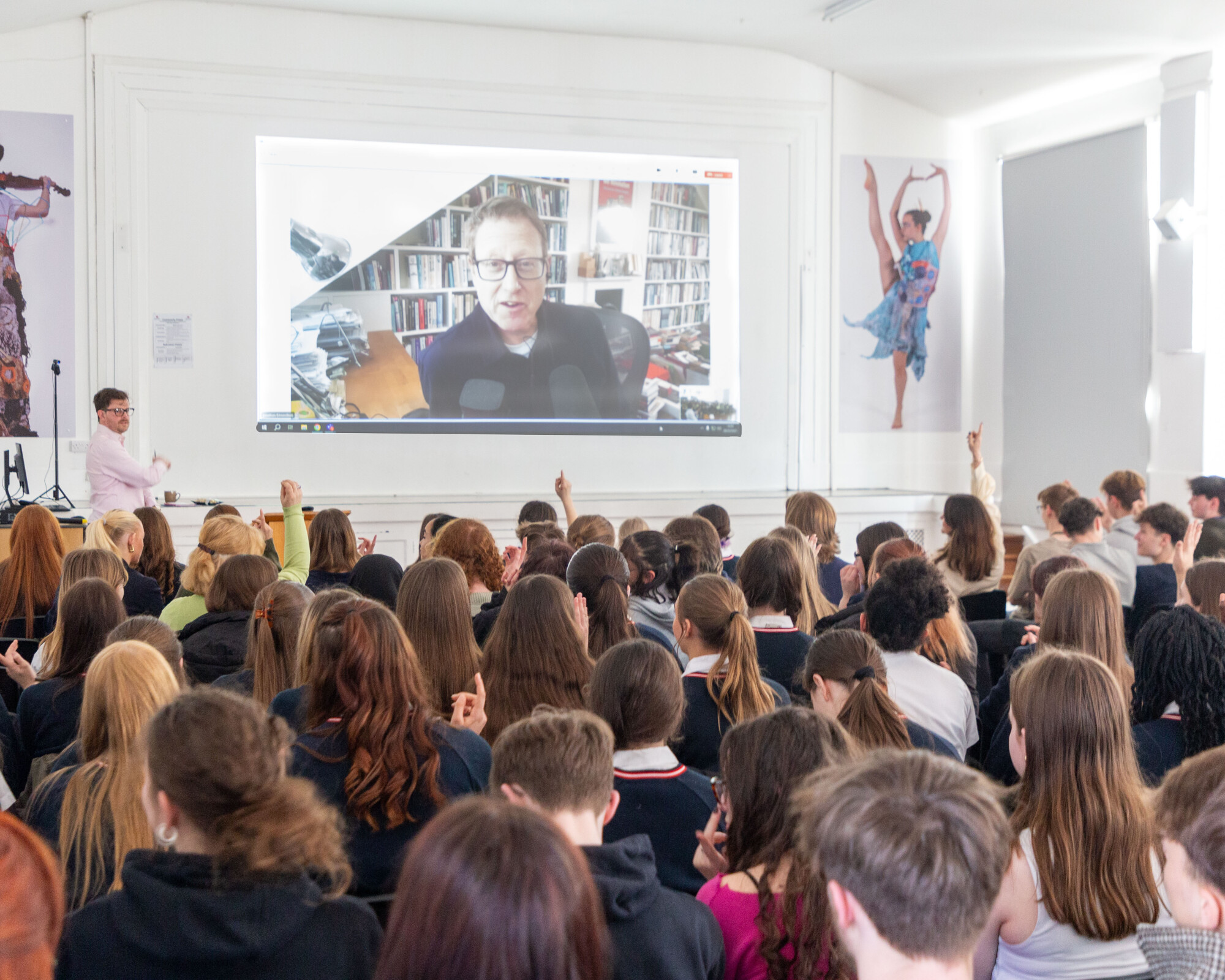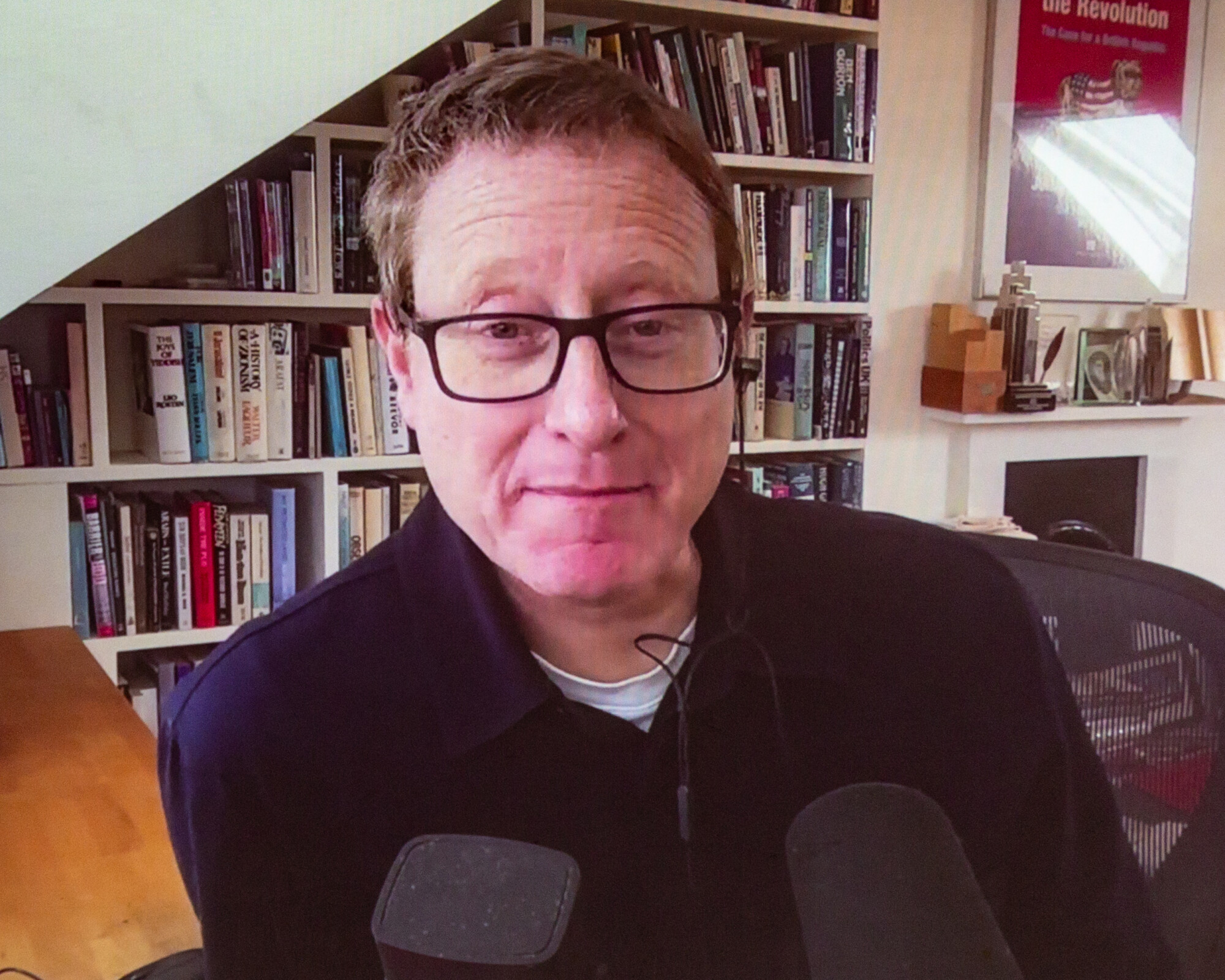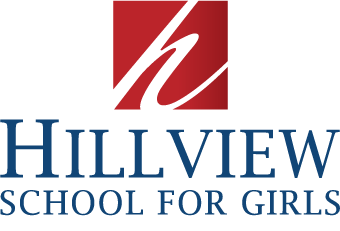Journalism Unveiled: Jonathan Freedland Inspires the Next Generation at Hillview School
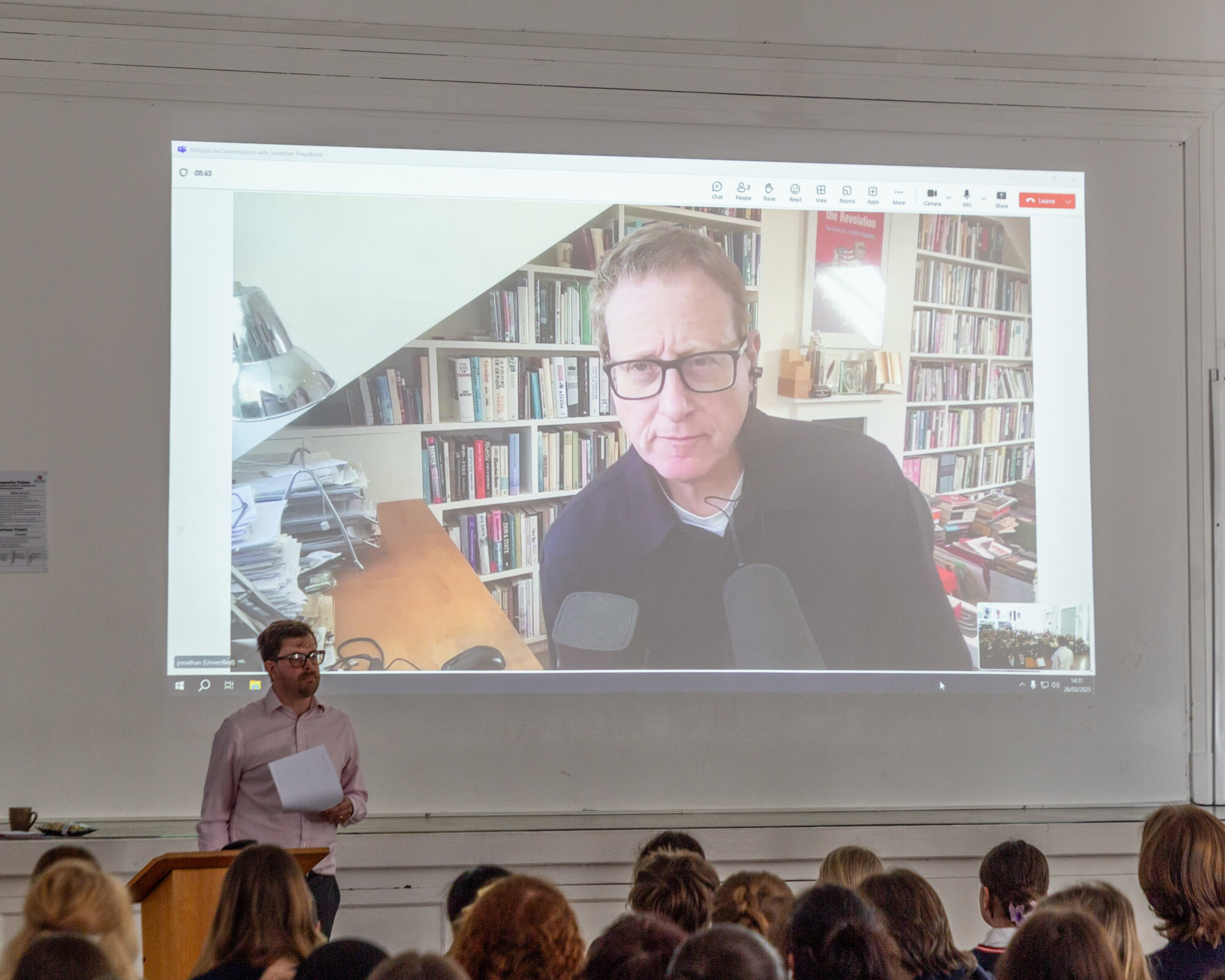
George Orwell once famously wrote that good prose should be like a windowpane, transparent to the reader and reflecting meaning without the smears of poor construction or the cloudiness of jargon. Our speaker shared this information with the enraptured audience and then exhibited it for an enthralling and enriching hour.
This speaker was Jonathan Freedland – Guardian columnist, veteran journalist and best-selling novelist.
On a vibrant afternoon at Hillview School, students from Hillview and Hillview Sixth Form had the unique opportunity to engage in a thought-provoking discussion with renowned journalist Jonathan Freedland. Known for his extensive career that spans over two decades, Freedland's work includes articles for prestigious publications and authorship of significant books on contemporary political issues. This session allowed students to gain insights into the world of journalism, offering a glimpse into Freedland's experiences, challenges, and advice for aspiring writers.
As the clocks struck at 25 minutes past two, students filled the school hall with palpable anticipation. Mr. Downing, the moderator of the event, warmly welcomed Freedland and began the session by posing foundational questions about his life and career in journalism. Once the stage was set, the floor was opened to questions from the eager audience, particularly the members of the journalism club, who were keen to learn from the esteemed journalist.
The first question posed by the students was, "What does your average working day look like?" Freedland elaborated on the diversity and unpredictability that define his daily routine. He provided an intriguing example from recent weeks: that morning could involve meetings discussing recent UK Government politics, followed by an afternoon focused on a sensitive issue involving women’s rights activists deceived by undercover police officers. Freedland's adaptability to such topics showcases the dynamic nature of journalism, where no two days are identical. Typically, he spends his mornings dedicated to writing and researching for articles or columns, followed by a lunch break and an afternoon of editing and discussing with his editor about the article's finer details, including headlines and potential imagery.
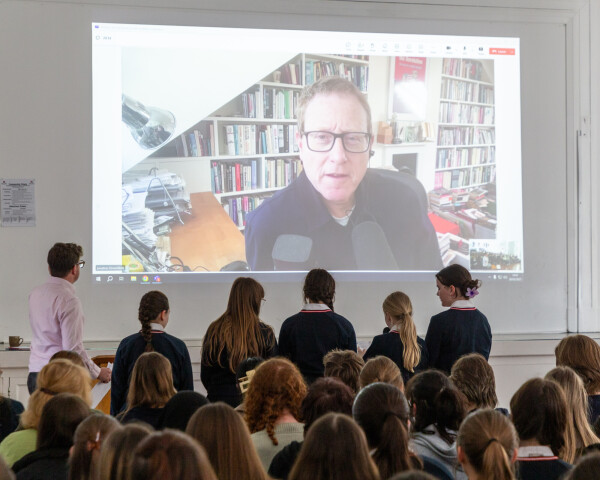 The enthusiasm of the journalism club was evident as they inquired about the opportunities that journalism has afforded Freedland throughout his career. Journalism allowed him to travel the world, learn new things, and meet fascinating individuals with compelling stories. This global exposure and the chance to connect with diverse narratives highlight one of the most rewarding aspects of a career in journalism.
The enthusiasm of the journalism club was evident as they inquired about the opportunities that journalism has afforded Freedland throughout his career. Journalism allowed him to travel the world, learn new things, and meet fascinating individuals with compelling stories. This global exposure and the chance to connect with diverse narratives highlight one of the most rewarding aspects of a career in journalism.
When asked for advice on how to enter the field of journalism, Freedland emphasised one crucial piece of guidance: just start writing. He encouraged students to write as much as possible and to pay attention to what piques people's interest. This practice not only sharpens their writing skills but also aligns with the essence of journalism, which fundamentally revolves around engaging with topics that resonate with the audience.
Another notable figure in journalism, George Orwell, served as a reference in Freedland's talk. While Orwell is widely recognised for his groundbreaking fiction, Freedland emphasised that his influence in journalism is equally significant. He highlighted two key principles for effective writing: clarity and beauty. Good journalism should be easily comprehensible and accessible to the reader. Freedland stressed the importance of simplicity in language, cautioning against unnecessary complexity. Additionally, he implored that journalistic writing must also possess an element of beauty to captivate readers, enabling them to connect emotionally with the narrative as though they are witnessing the events firsthand.
The dialogue continued as a student asked Freedland about the greatest challenge he has faced in his writing career. With a reflective chuckle, he recounted the past two years as the standout in his over 20-year-long career, particularly the difficulty of navigating the sensitive and often disheartening Gaza-Israel conflict. He explained that documenting a narrative that seems devoid of hope is a significant challenge in itself. Moreover, Freedland noted that no matter how he presents the story, he often finds himself angering different factions on either side of the conflict. He has always aimed to provide balanced coverage, writing about both Gaza and Israel equally. Yet, sourcing feedback from either side often results in backlash, pointing to the complexities of reporting on deeply polarising issues.
This honest reflection laid the groundwork for a deeper conversation about the integrity of journalism and the journalist's role in society. Another student ventured to ask, “Do you have any advice on how we can avoid or combat fake news in the media or at school?” Freedland was quick to respond, emphasising that the best defence against misinformation lies in critical thinking and careful analysis of sources. He advised students to consider who is publishing the information they consume and to gravitate toward media outlets with a proven track record of journalistic integrity, such as the BBC and The Guardian. Freedland highlighted that reliable news organisations are typically committed to accuracy and correction, often maintaining a dedicated column for corrections to uphold accountability for their reporting.
A question arose regarding Freedland's thoughts on The Washington Post, which he has previously contributed to. He conveyed his hesitations about the publication, acknowledging the presence of outstanding journalists within its ranks yet expressing concerns about external influences, particularly from the ownership under Jeff Bezos. Freedland voiced a principled belief that journalism should stand firm against power, emphasising the need for honesty and integrity within the profession. He articulated this philosophy through the phrase, "Speak truth to power," underlining the ethical responsibility of journalists to hold authority accountable.
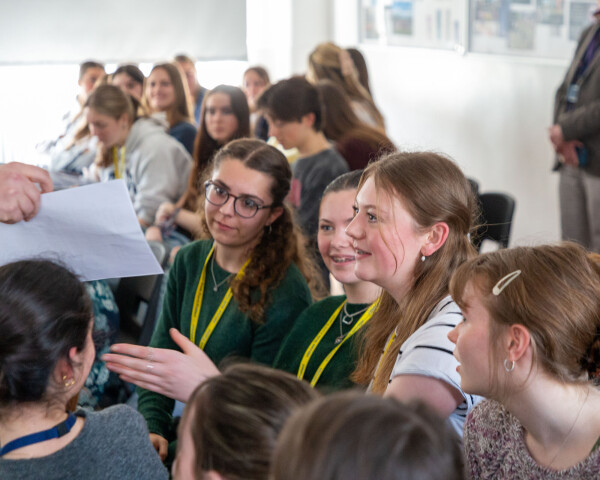 Freedland next reflected on a student's notable observation about the physical newspaper industry's decline. During the talk, he explained that traditional print journalism is facing unprecedented challenges. Major publications, including The Guardian, have shifted their practices, with many reducing their daily print output to weekend editions only. This transformation, while disheartening for some, sparked a broader dialogue about the future of journalism. Freedland reiterated his belief that while the formats might change, journalism itself will continue to endure. He attributed this resilience to an intrinsic human desire to understand and share knowledge.
Freedland next reflected on a student's notable observation about the physical newspaper industry's decline. During the talk, he explained that traditional print journalism is facing unprecedented challenges. Major publications, including The Guardian, have shifted their practices, with many reducing their daily print output to weekend editions only. This transformation, while disheartening for some, sparked a broader dialogue about the future of journalism. Freedland reiterated his belief that while the formats might change, journalism itself will continue to endure. He attributed this resilience to an intrinsic human desire to understand and share knowledge.
To illustrate his point, he gave a fictional example of a scenario involving two teachers engaged in a heated argument in a staff room. The natural curiosity that would compel some to eavesdrop on the conversation, or to inquire about the details afterwards, reflects the foundational essence of journalism. Freedland emphasised that in moments like these, the act of sharing information transforms ordinary individuals into journalists, highlighting that curiosity fuels the journalism world.
Following this discussion, a student inquired about Freedland's approach to structuring long-form writing. Freedland responded with a light-hearted laugh, revealing that his methodology closely mirrors the techniques he learned in secondary school. For every article he undertakes, Freedland insists on creating what students know as an essay plan before putting pen to paper. This methodical approach, evidenced by his practice of ticking off each section as it is completed, was met with nods of approval from the English teachers present. For students, Freedland's strategy serves as an invaluable framework that can significantly improve their essay-writing skills, emphasising the importance of preparation and structure.
The conversation then shifted to Freedland's experience writing his historical novel, The Escape Artist, which chronicles the extraordinary true story of Rudolf Vrba, a young man who escaped Auschwitz to reveal the atrocities of the Holocaust. Freedland recounted how he embarked on this project during the isolation of the COVID-19 lockdowns in 2020. His research led him to connect with Vrba's childhood sweetheart, now in her nineties. Their conversations, which took place in her garden over several summer meetings, provided Freedland with firsthand insights into Vrba's life.
Tragically, just days after their final meeting, Freedland learned of the woman's passing. She had left him a profound gift—a red suitcase containing over seventy years of letters exchanged between her and Vrba. Freedland reflected on the honour he felt in being entrusted with such a personal narrative and the depth it added to his understanding of Vrba's legacy. The impact of her life story, shared in those intimate moments, underscored the significance of preserving history and the weight of responsibility that accompanies storytelling.
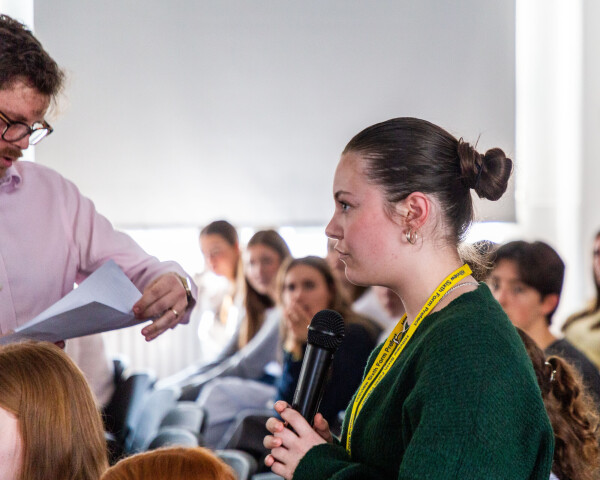 As time drew short, a final question arose regarding the relationship between journalism and religion. Freedland elaborated on the profound influence religion wields over journalism, arguing that it is inseparable from the contextual realities of reporting. He noted that religion's intersection with laws and political dynamics reflects the unique history of each nation. Freedland pointed out the contrasting roles religion plays in British and American politics. Despite their similarities as English-speaking nations in the developed Western world, their approaches to religion within the public sphere diverge significantly, a fact often overlooked by observers.
As time drew short, a final question arose regarding the relationship between journalism and religion. Freedland elaborated on the profound influence religion wields over journalism, arguing that it is inseparable from the contextual realities of reporting. He noted that religion's intersection with laws and political dynamics reflects the unique history of each nation. Freedland pointed out the contrasting roles religion plays in British and American politics. Despite their similarities as English-speaking nations in the developed Western world, their approaches to religion within the public sphere diverge significantly, a fact often overlooked by observers.
In the end, Jonathan Freedland's thoughtful reflections on the trials and tribulations of being a journalist left a profound impact on the students, challenging them to think critically about the information they consume and the role they can play in upholding the standards of journalism in their own work. The session not only inspired a passionate response concerning the future of journalism but also solidified the importance of resilience, integrity, and clarity in navigating the complex world of storytelling and reporting. Through this engaging dialogue, Freedland equipped the next generation of journalists with the understanding that they hold the power to influence and educate, reminding them of their critical role in shaping public discourse in an ever-evolving media environment.
